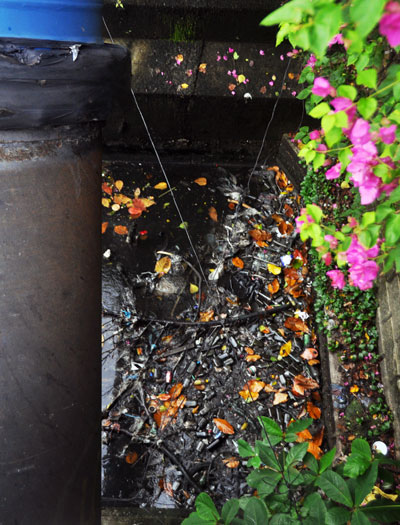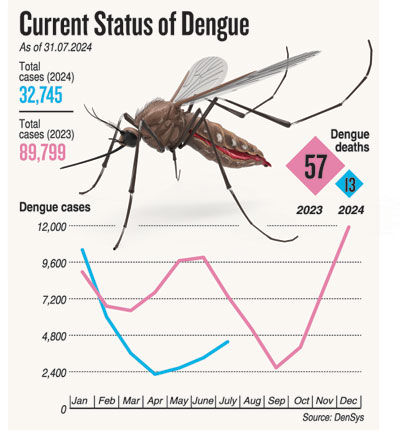News
Deadly dengue surge pushes patient count near 33,000
View(s):By Nathara Abeywickrema
The National Dengue Control Unit (NDCU) of the Ministry of Health has issued a warning that a potential rise in dengue cases in the coming weeks could be due to lower public vigilance towards prevention, especially in light of the rains.
As of mid year Sri Lanka has reported 32,967 dengue patients, with high transmission rates in several regions, Consultant Community Physician of the NDCU Dr. Nimalka Pannila Hetti said.

Blocked drains after rains (Pic by Nilan Maligaspe)
The Western Province including the Colombo district, is particularly affected with 7,864 reported patients, but there are substantial numbers in Gampaha District amounting to 3,569, and Kalutara District 1,799, leading to increased public health concerns, Dr. Pannila Hetti said.
Kandy (11.8%), Ratnapura (7.9%), Kegalle (3.3%), Kurunegala (3.3%), Matara (3.3%), and Galle (3.0%) districts have also reported a higher number of cases.
This surge is attributed to the monsoon season, which creates ideal breeding conditions for the Aedes mosquito, the primary vectors of dengue, Director of NDCU Dr. Sudath Samaraweera said.

A mosquito (AFP)
In the 30th week, case reporting indicated a slight increase compared with the previous week, he said. Medical Officer of Health attached to the NDCU Dr Indralingam said it is highly probable that if strict vector control measures are implemented in high-risk MOH areas, infections will gradually fall.
Yatinuwara, Boralesgamuwa, Moratuwa, Negombo, Elapatha, and Kaluwanchikudy MOH areas have recently been identified as high-risk zones. Kolonnawa, Pitakotte, Kahathuduwa, Rathnapura MC, Kuruvita, and Kelaniya MOH areas have also been designated as high-risk.
Hospitals and clinics have set up dengue treatment facilities and protocols to manage the influx of patients, the Medical Officer at the NDCU Dr. Lahiru Kodithuwakku said.
People’s cooperation in maintaining cleanliness of surroundings and reducing mosquito breeding sites is crucial to controlling the outbreak, he said.
Medical experts and specialist consultants have emphasised that pregnant women who develop a fever should be taken to a hospital.
People are also advised to seek prompt medical attention for any type of fever rather than relying on home remedies.
Paracetamol (acetaminophen) is recommended for treating pain and fever. However, they advise against the use of aspirin, other salicylates, and nonsteroidal anti-inflammatory drugs (NSAIDs).
Ongoing efforts include mosquito control measures such as fogging, community clean-up campaigns to eliminate breeding sites, and public awareness programmes about preventive practices, said the secretary of PHI union Shanaka Bopitiyage. He said PHIs adapt their response as necessary. Individual responsibility also plays a key role in managing and mitigating the spread of dengue. Take preventive measures, seek timely medical care, and support community initiatives, was his message to Sri Lankans.

The best way to say that you found the home of your dreams is by finding it on Hitad.lk. We have listings for apartments for sale or rent in Sri Lanka, no matter what locale you're looking for! Whether you live in Colombo, Galle, Kandy, Matara, Jaffna and more - we've got them all!

